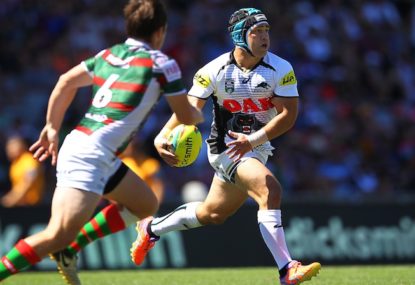A fundamental problem with modern sport is that many of the teams possess uncertain identities. This makes it difficult for supporters to form emotional connections with them and with matches involving these teams.
Context is what makes sport the fantastic spectacle that it is. For a match to have meaning to the supporters and the players, it has to have significance.
Context can firstly be defined by what’s at stake in a particular match.
The difference between a Nadal-Federer exhibition match and a Wimbledon final is not only what the match means to the fans, but what it means to the players. The tension before the final is palpable, and regardless of the outcome, the context creates a drama all its own.
Secondly, context can be defined by the identities of opponents. One of the reasons new teams struggle to pull crowds is because they have not yet created their own identity.
For example, it has been difficult to draw crowds to the Asian Champions League because teams such as Kawasaki Frontale and Guangzhou Evergrande lack identity for the Australian public.
Those teams have their own avid supporters with an intimate knowledge of their side, but the real context is only formed by including an intimate knowledge of the opposition. This causes emotions to run deep, and often results in the clash between the two sides being seen as ‘great’.
Clubs consisting of players who are defended to the hilt by their supporters are a rarity these days, although they do exist in pockets. They are usually sides that identify themselves as locals.
The Queensland Reds, for example, fielded a team a couple of weeks ago that was made up entirely of their academy squad members. The Geelong football club also has a local focus, rarely trading players in from other clubs.
When there is a large transfer of players between teams, it is extremely difficult to keep one’s emotions in check.
Imagine, for example, a Penrith supporter last year rattling off the 25 reasons he hates the St George Illawarra Dragons, and in particular “that pretender” Jamie Soward, only to be told that Soward is to be the Panthers five-eighth in 2014. This was surely emotionally difficult for him to come to terms with.
Team identities can be successful even if they are overwhelmingly negative. The Brisbane Broncos have been an amazing team for the NRL, loved by some of those living north of the border but also loathed by many.
This loathing often gets people through the turnstiles to express their dislike of the team. The Broncos, Manly, Canterbury and the Crusaders are teams whose matches are always well supported – not only at home but by the supporters of teams they play against.
Understanding the nature of teams that people love to hate is crucial to any competition. After all, everybody loves a good villain.
A team’s identity also has to be recognised and embraced by their own fans. Getting the fans to buy into what the team says about them is a strategy which marketers would define as brand engagement.
Collingwood fans are one of the best examples of this. No other team in Australia has the kind of instant recognition between team and supporter that Collingwood does, so much so that being called a bogan elsewhere is the same as being called a Collingwood supporter in Melbourne.
This draws me into the argument of changing names, a la North Melbourne to the Kangaroos, to remove geographical boundaries. This idea is crazy, because it only results in long-term supporters being isolated from their association to the team and confuses the rest of the world.
I am sure the 659 million Manchester United fans do not mind not living in Manchester, and they would probably storm the city if the team changed names.
Ninety-nine per cent of teams in the world focus so much on the here and now of winning that they don’t see the long-term picture.
They need to ask questions like how many people would show up if we were coming last?
How many of our players do our supporters see as part of the fabric of the team?
If we are winning, why isn’t our stadium full?
The NFL’s Green Bay Packers have sold out every regular season game since 1959. They went below a 50 per cent winning record in 16 of those seasons, and have the smallest market in the NFL. They now have a stadium with a capacity of over 80,000.
By contrast, between 1982 and 1994 the LA Raiders won a Super Bowl and had only three seasons under 50 per cent of wins, but by 1994 the attendances were as low as half that of the Packers in the largest city in the USA.
The greatest or best-known sports teams are those that have formed an identity for themselves over the years. It is this identity that supporters of the team hold onto and embrace when following the team through a particular season or tournament.
As players are now transferring from one club to another more frequently, maintaining an identity becomes difficult. For teams to maintain a large support base, they need to formulate and mould an identity for themselves which supporters will recognise and buy into.
Importantly, this identity must arise organically out of a real connection between club, playing group and supporter base, as nothing is more unappealing than an artificial, top-down corporate image forced upon a side to generate interest.
So which teams do you love to hate, and which teams do you struggle to care about?





























































































